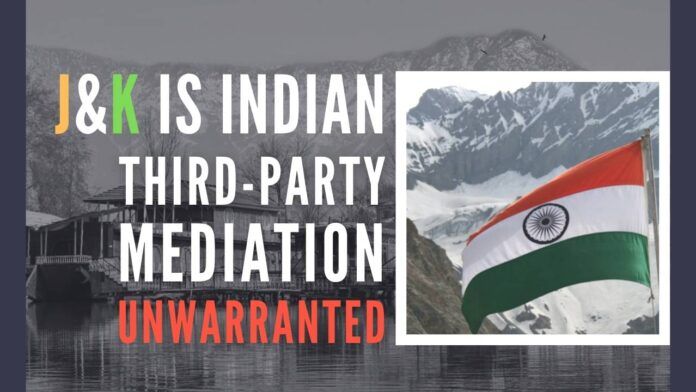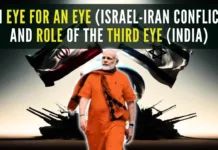
Cobwebs of confusion about New Delhi and Islamabad involved in a dialogue process behind the curtain
Reports emanating from Dubai, Abu Dhabi and Srinagar have revealed that New Delhi and Islamabad held secret talks in Dubai in January. The talks, according to reports, were calculated to reducing tensions between the two nuclear states and framing “a modest roadmap to normalizing ties,” which had been worsening since the 2019 terrorist attack on a CRPF (Central Reserve Police Force) convoy in Kashmir’s Pulwama martyring over 40 CRPF personnel and the abrogation of Article 370 in August that year.
A revelation to this effect was made by none other than the United Arab Emirates (UAE) Ambassador Yousef Al Otaiba. In a virtual discussion with Stanford University’s Hoover Institution on April 14, Otaiba claimed that the “UAE played a role in bringing Kashmir escalation down’ and created a ceasefire, hopefully ultimately leading to restoring diplomats and getting the relationship back to a healthy level”. “They might not sort of becoming best friends but at least we want to get it to a level where it’s functional, where it’s operational, where they are speaking to each other,” he also told Hoober Institution.
External Affairs Minister S Jaishankar visited the capital of the UAE on April 18 reportedly with a focus on “bilateral economic cooperation and community welfare”.
When asked about media reports that “backchannel talks between India and Pakistan were going on for more than a year”, External Affairs Ministry spokesperson Arindam Bagchi did not give a direct reply. He only said; “If you talk about channels of communication on this issue, let me just recall that our respective high commissions exist and are functioning. So that is a very effective channel of communication,” Bagchi said as early as on April 9.
Interestingly, the same day, Pakistan Foreign Office spokesman “stopped short of categorically denying its involvement in some kind of backchannel talks with India”. Foreign Office spokesperson Zahid Hafeez Chaudhry at the weekly press briefing on April 9 was asked by several journalists about reported backchannel talks with India. Instead of rejecting it outrightly, he said: “States have their ways and means to communicate which remain available even during wars. Therefore, whether any talks are taking place between India and Pakistan is not important”. “The real issue is what should be discussed between the two countries and how the dialogue could be made meaningful and result-oriented dialogue,” he also said during the weekly press briefing.
However, it was Pakistan’s Foreign Minister Shah Mahmood Qureshi who, on April 18, welcomed what he called “third-party mediation” to ease Indo-Pak tensions but denied an India-specific agenda behind his ongoing visit to the UAE. “I am here for a bilateral visit and not an India-specific agenda. My agenda is UAE-Pakistan and not India-Pakistan,” Qureshi told the Khaleej Times. “I don’t think a meeting is set out with the Indian foreign minister,” he also said.
External Affairs Minister S Jaishankar visited the capital of the UAE on April 18 reportedly with a focus on “bilateral economic cooperation and community welfare”. Commenting on Jaishankar’s visit to UAE, the IFO ruled out the possibility of any meeting with his Pakistani counterpart.
Who is Pakistan to interfere in India’s internal affairs, including New Delhi’s policy towards J&K or the Centre-State relations?
What the Indian Foreign Office and Pakistan Foreign Office said on April 9 cleared all the cobwebs of confusion established beyond any doubt that both New Delhi and Islamabad were involved in a dialogue process behind the curtain.
As per reports, “officials from India’s Research and Analysis Wing (R&AW) and Pakistan’s Inter-Services Intelligence (ISI) travelled to Dubai for a meeting facilitated by the UAE Government”. It is not clear as to what exactly transpired during the Dubai talk. However, one report in this regard said, “This (modest framework) would include Pakistan dropping its loud objections to PM Modi abrogating Jammu and Kashmir’s autonomy in August 2019, while Delhi, in turn, would refrain from blaming Pakistan for all violence on its side of the Line of Control (LoC)”.
Who is Pakistan to interfere in India’s internal affairs, including New Delhi’s policy towards J&K or the Centre-State relations? J&K was needed to be brought at par with other states of the union and under the ambit of all the Central laws and all the Central institutions to bring separatists in Kashmir to India’s knees and PM Modi and HM Shah did it in a very effective manner on August 5-6, 2019, with the full concurrence of Parliament, highest law-making body. The nation heaved a sigh of relief when the PM and the HM undid Nehru’s grave wrongs.
Similarly, how can India forget and forgive what Pakistan has been doing to bleed India and dismember it ever since its creation out of India in August 1947? The one-point agenda of Pakistan has been to grab the leftover J&K and hoist its green flag at Red Fort. It says day in and day out that “J&K is an unfinished agenda of partition”. The whole nation knows it. The nation also cannot forget the brutal manner in which Pakistan — with the help of Nehru and Congress — annexed, bloodied and converted 100% of J&K’s areas called PoJK (Pakistan-
One thing is absolutely clear, the only issue which still remains unresolved between India and Pakistan is the determination of the political future of PoJK and Gilgit-Baltistan and not one but three unanimous Parliamentary resolution have committed the nation to take back from Pakistan these areas. India can’t retrieve these areas by taking recourse to diplomacy; it has to use its military might to fulfil the national resolve. There is no other way.
The point is that New Delhi must take the nation into confidence before formulating any roadmap as far as Indo-Pak relations vis-à-vis J&K are concerned. It should also explain what the nation achieved through the so many Chaophraya Dialogues (Bangkok), by holding talks with Pakistan at Thimpu (Bhutan), Delhi, Agra, Sharm-el-Sheikh (Egypt), Paris, Moscow, Islamabad and Lahore and through the Lahore bus or by repeatedly extending hands of friendship to Pakistan from Srinagar and Delhi. New Delhi would do well to remember that Pakistan is Pakistan and that the only treaty between the two nations the sanctity of which has been maintained is the World Bank-brokered Indus Water Treaty 1960, which benefits Pakistan and causes huge losses to India. New Delhi must look all these facts in the face and must avoid Dubai-type secrete talks with Pakistan. Such talks only embolden Islamabad and its agents in Kashmir.
Note:
1. The views expressed here are those of the author and do not necessarily represent or reflect the views of PGurus.










